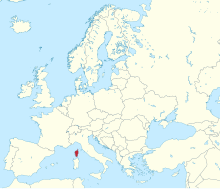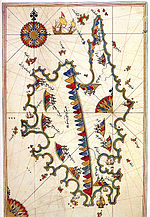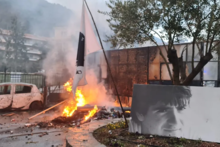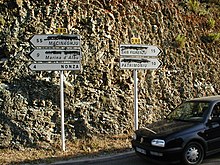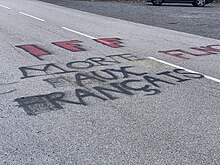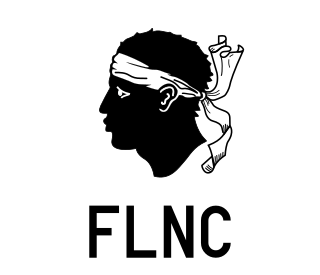
The National Liberation Front of Corsica is a militant group that advocates an independent state on the island of Corsica, separate from France. The organisation was primarily present in Corsica and less so on the French mainland. A Conculta Naziunalista was often considered to be the political wing of the organisation.
Regionalism is a political ideology that seeks to increase the political power, influence and self-determination of the people of one or more subnational regions. It focuses on the "development of a political or social system based on one or more" regions and/or the national, normative or economic interests of a specific region, group of regions or another subnational entity, gaining strength from or aiming to strengthen the "consciousness of and loyalty to a distinct region with a homogeneous population", similarly to nationalism. More specifically, "regionalism refers to three distinct elements: movements demanding territorial autonomy within unitary states; the organization of the central state on a regional basis for the delivery of its policies including regional development policies; political decentralization and regional autonomy".

Corsica is an island in the Mediterranean Sea and one of the 18 regions of France. It is the fourth-largest island in the Mediterranean and lies southeast of the French mainland, west of the Italian Peninsula and immediately north of the Italian island of Sardinia, the nearest land mass. A single chain of mountains makes up two-thirds of the island. As of January 2024, it had a population of 355,528.

The Party of the Corsican Nation is a Corsican nationalist and autonomist political party on the French island of Corsica. It was founded in Corte in 2002 by members of three nationalist parties, Union of the Corsican People (UPC), A Scelta Nova and A Mossa Naziunale.

The history of Corsica goes back to antiquity, and was known to Herodotus, who described Phoenician habitation in the 6th century BCE. Etruscans and Carthaginians expelled the Phoenicians, and remained until the Romans arrived during the Punic Wars in 237 BCE. Vandals occupied it in 430 CE, followed by the Byzantine Empire a century later.

Italian irredentism in Corsica was a cultural and historical movement promoted by Italians and by people from Corsica who identified themselves as part of Italy rather than France, and promoted the Italian annexation of the island.

The French conquest of Corsica was a successful expedition by French forces of the Kingdom of France under Comte de Vaux, against Corsican forces under Pasquale Paoli of the Corsican Republic. The expedition was launched in May 1768, in the aftermath of the Seven Years' War. A French expeditionary force was landed on the island of Corsica, then ruled by the Corsican Republic. Marching inland to overcome any Corsican opposition, the French force initially suffered an unexpected defeat at the Battle of Borgo. But a new commander, the Comte de Vaux, was appointed to lead the expedition, and decisively defeated the Corsican army at the Battle of Ponte Novu in 1769, effectively bringing an end to Corsican resistance.

Petru Rocca was a Corsican politician and writer who supported Corsican independence from France. Initially he advocated regionalism for Corsica within the French state. He briefly supported Italian irredentism in Corsica, before returning to a position of French-Corsican regionalism before World War II.
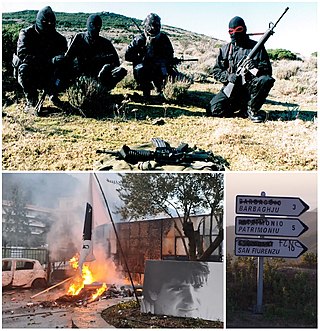
The Corsican conflict is an armed and political conflict on the island of Corsica which began in 1976 between the government of France and Corsican nationalist militant groups. Beginning in the 1970s, the Corsican conflict peaked in the 1980s before Corsican nationalist groups and the French government reached a truce in 2016. It is currently ongoing following the 2022 Corsica unrest.

The 2015 Corsican protests were a series of marches by several hundred Corsican nationalists that began on 25 December, in Ajaccio, capital of Corsica. During the initial demonstrations, a Muslim prayer hall was burned down and Qur'ans were set alight. Further protests were organised after the initial march despite a government ban on protests until 4 January 2016. The protesters claimed to be acting in revenge for an incident that occurred the day prior when firefighters and police were assaulted in the neighbourhood of Les Jardins de l'Empereur; however, outside observers labeled the ensuing riots as anti-Arab and anti-Muslim. The Corsican nationalist politicians have claimed their view does not legitimise xenophobia, blaming the protest on French nationalism instead. Scholarly opinions on this claim are divided.
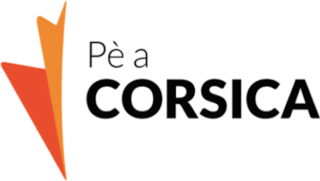
Pè a Corsica was a Corsican nationalist political alliance in France, which was calling for more autonomy for Corsica. More specifically, it was a coalition of the two Corsican nationalist parties active on the island; that is, the moderately autonomist Femu a Corsica and the strongly committed separatist Corsica Libera. The party was led by the autonomist Gilles Simeoni. The alliance was renewed for the 2017 territorial election. However, the alliance was dissolved for the 2021 territorial election.

Femu a Corsica is a Corsican autonomist political party. It was formed for the first time prior to the 2010 French regional elections in the form of a political coalition. The coalition members, Inseme per a Corsica, the Party of the Corsican Nation (PNC) and Chjama Naziunale, merged during the founding congress of the party in Corte on 15 October 2017. The PUDEMU movement also merged into the new party. The PNC was later re-established in 2019. The leader of the party is Gilles Simeoni.
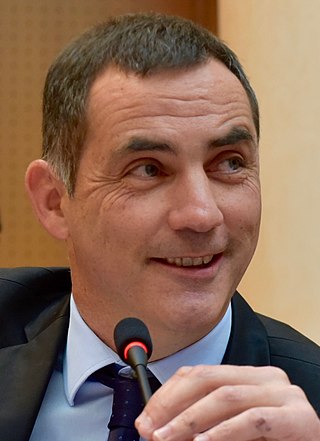
Gilles Simeoni is a lawyer and politician in Corsica, France. He was mayor of Bastia from 2014 to 2016 and has been president of the executive council of Corsica since 2015. Notably, Simeoni served as the Corsican nationalist Yvan Colonna's lawyer at his trial for the assassination of Claude Érignac.
The 2017 Corsican territorial elections were held on 3 and 10 December 2017 to elect 63 members of the Corsican Assembly, who in turn determined the composition of the Executive Council of Corsica. The election was held only two years after the 2015 territorial elections, and were called as a result of the planned creation of a single collectivity within Corsica resulting from the mergers of two departments, and the existing territorial collectivity of Corsica.
A double bomb attack took place in the city of Nice, France on 20 July 2003. Sixteen people were injured in the blasts against the regional directorates of customs and the treasury. The Corsican separatist National Liberation Front of Corsica (FLNC) claimed responsibility, and was one of the biggest bombs exploded by the group on the French mainland.

Edmond Simeoni was a Corsican doctor, politician and nationalist. He was the brother of Max Simeoni, Member of the European Parliament (MEP) from 1989 to 1994 and father of Gilles Simeoni.
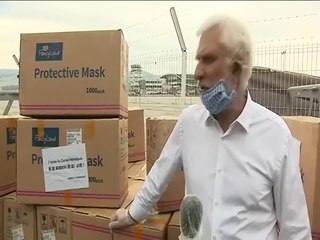
Laurent Marcangeli is a French politician who has been serving as a member of the National Assembly from 2012 to 2017 and again from 2022, representing Corse-du-Sud's 1st constituency.
Marie-Antoinette Maupertuis, also called Nanette Maupertuis, is a French politician and academic practicing in Corsica.

In March 2022, the island of Corsica, France, saw protests in response to a prison attack on nationalist leader Yvan Colonna. There were rallies in the main cities of Ajaccio, Calvi and Bastia that descended into violent clashes between police and protestors. Protestors threw stones and flares at gendarmes.

Corsican autonomy is the principle and a movement for autonomy or self government for the island of Corsica, with political powers devolved from the French government.

